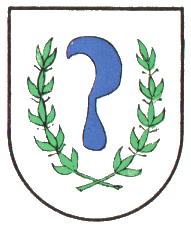Oberweier (Gaggenau): Difference between revisions
Jump to navigation
Jump to search
Knorrepoes (talk | contribs) m (Text replacement - "/Arms of " to "/Arms (crest) of ") |
Knorrepoes (talk | contribs) m (Text replacement - "{{media}}" to " {{de1}} {{media1}}") |
||
| Line 20: | Line 20: | ||
The State Archives proposed in 1900 to use the composition as official arms, but the council never answered to the proposal. In July 1959 the council applied for arms, based on the seal from the 18<sup>th</sup> century. The arms were granted in arbitrary colours on September 14, 1959. | The State Archives proposed in 1900 to use the composition as official arms, but the council never answered to the proposal. In July 1959 the council applied for arms, based on the seal from the 18<sup>th</sup> century. The arms were granted in arbitrary colours on September 14, 1959. | ||
{{ | |||
{{de1}} | |||
{{media1}} | |||
[[Civic Heraldry Literature - Germany|'''Literature''']]: Zier and Futterer, 1966. | [[Civic Heraldry Literature - Germany|'''Literature''']]: Zier and Futterer, 1966. | ||
Revision as of 11:47, 26 December 2022
This page is part of the German heraldry portal Deutsche Wappensammlung |
Heraldry of the World |
|
German heraldry:
|
Selected collector's items from Germany:
|
OBERWEIER
State : Baden-Württemberg
District (Kreis) : Rastatt
Incorporated into : 1972 Gaggenau
| German | In Silber zwischen zwei schräggekreuzten grünen Lorbeerzweigen ein blaues Weinmesser
Origin/meaningThe oldest known seal of the village dates from 1604 and shows in a shield a knife, used for cutting grapes. The same knife appears in a 18th century seal, but now surrounded by laurel branches. The State Archives proposed in 1900 to use the composition as official arms, but the council never answered to the proposal. In July 1959 the council applied for arms, based on the seal from the 18th century. The arms were granted in arbitrary colours on September 14, 1959. Literature: Zier and Futterer, 1966. |


